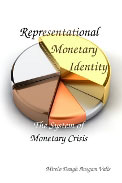"Thus through stage after stage of expansion, "money" can grow to a total of 10 times the new reserves supplied to the banking system, as the new deposits created by loans at each stage are added to those created at all earlier stages and those supplied by the initial reserve-creating action."

 |
Representational Monetary Identity:
The System of Monetary Crisis by Mirelo Deugh Ausgam Valis Lulu
book review by Robert Gover
The name of the author of this highly technical book is a pseudonym designed to protect the author if or when his proposal is taken seriously. To understand his proposal, he first reveals what is called "fractional-reserve" banking, which routinely turns $1 million loaned by one bank into $100 million loaned by ten banks, without a physical dollar bill being moved.
The fractional reserve system dates back to medieval times when "moneychangers" stored gold and other precious do-dads for their customers. If you had, say, a thousand francs worth of gold in the keeping of your local moneychanger and wanted to have some walk-around money, your moneychanger would give you a paper certificate worth the price of your gold, less 10 percent. The withheld 10 percent was in case the moneychanger's customers suddenly demanded their precious deposits be returned. Financial history is plump with "runs on banks" caused by depositors suddenly demanding their money back, causing many a good banker to flee for his life because he had loaned it all out.
After explaining the glories of the fractional-reserve system, Valis then proceeds to explore his proposal, which takes us into the nuts and bolts of representational monetary identity, a concept as fascinating as a gigantic squid's flashing lights in ocean depths rarely visited by humans.
Example: "1. Nothingness is the absence of something, possibly of everything. 2. If anything is absent, then a) its presence is nothing (and) b) The nothingness of its presence is present."
This and other brain twisters results from virtually all our money being loaned to us at interest by our central bank, the Federal Reserve, a private corporation with a misleading name, protected from public scrutiny by layers of inscrutable absurdities.
For those who love philosophical conundrums, this becomes highly humorous. For those who have never before explored the wonder called "our monetary system" and its resulting national debt, a quote from Karl Marx provides guidance: "Reason has always existed, but not always in a reasonable form."